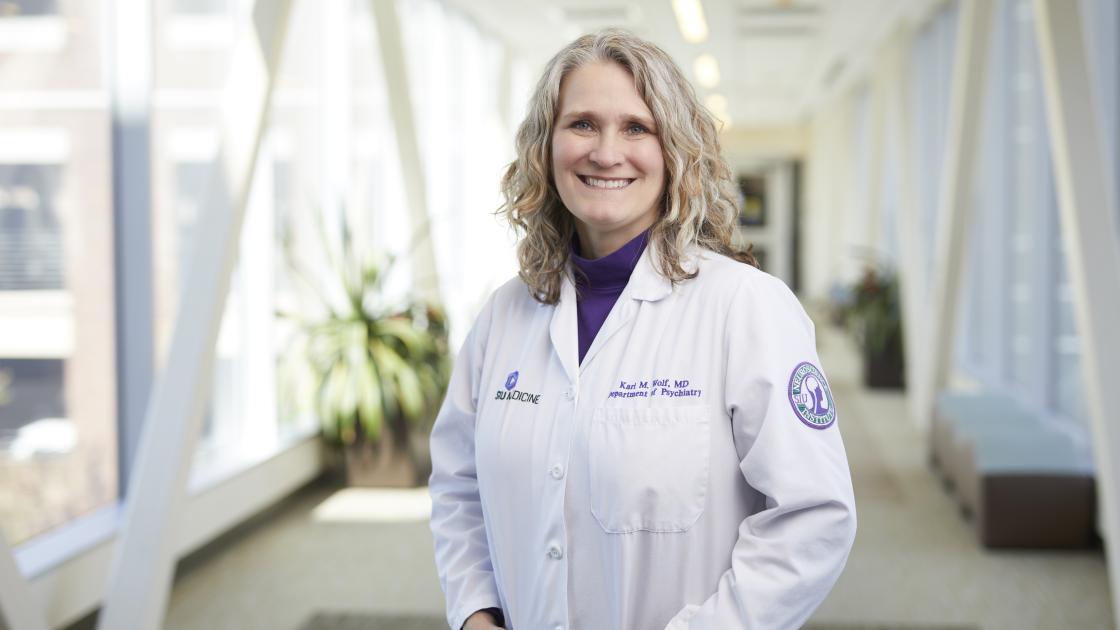
Turning ripples into waves
Dr. Kari Wolf oversees state’s new behavioral health training center
Kari Wolf, MD, has never been afraid of making waves. The chair of SIU Medicine’s Department of Psychiatry was born in Evanston, Illinois, and raised in Iowa where she experienced her first opportunity to challenge the status quo and make a meaningful impact.
At 12-years-old, Wolf fearlessly stood up for what she believed in when she chose, along with another student from rural Iowa, to file a federal lawsuit against the Iowa Girls High School Athletic Union, asserting that the state's 6-on-6 basketball rules violated the U.S. Constitution.
Even though the lawsuit was eventually dismissed, it resulted in the Des Moines school district switching to 5-on-5 girls' basketball. It also gave Wolf her first experience with rewriting policy, putting into motion an attempt toward systemic change. And she recognized that a partial victory was still a victory.
Her focus on psychiatry also began with a pivotal moment of realization. In year 4 of medical school, Wolf was preparing an application for an OB-GYN residency when she discovered she found a passion for psychiatry. Her student work with the patient population had struck a chord. She also saw it as an opportunity to be a part of “something transformational during the ‘decade of the brain’,” she said.
“Being part of a field that was going to transform so much throughout my career was very exciting,” she noted. “We had a basic understanding of how every other organ system worked, but no understanding of how the brain worked, and so I saw psychiatry as the last frontier in medicine.”
During her residency at the University of Iowa, Wolf decided she wasn’t going to just focus on helping one individual at a time – she would concentrate on innovating the systems of care so no one would be left to struggle with mental illness on their own, especially the most vulnerable in society.
“I was always someone who thought about the bigger system, even while I was taking care of my patient,” she said. “[Policy] was an area of medicine where I felt like I could make an impact beyond just the individual. I saw an opportunity to make things better at the system level.”
Innovating systems of care
After her residency, Wolf remained at University of Iowa to begin building her professional career. During her three and half years there, she taught primary care physicians to provide psychiatric care, provided telepsych services and built an integrated behavioral health network across the state for Blue Cross Blue Shield. Her career eventually took her to Austin, Texas, where she took on several roles: Residency Program Director; Medical Student Clerkship Director; Chair of Psychiatry for Austin Medical Education Programs and the University of Texas-Southwestern’s Austin campus; president and CEO of the Seton Mind Institute; and CMO for Seton Shoal Creek Hospital.
She focused on expanding the psychiatry workforce while reimagining ways to improve access. She started by asking two key questions: How do we transform the way we deliver mental health services? How do we improve the competence of primary care providers in treating mental illness?
She hired more faculty, building and expanding the residency programs to educate and train more psychiatrists. She also tackled the shortcomings of the two existing systems of care in the Austin metropolitan area (an 11-county region), which were not equitable for everyone in the community.
The public system primarily served patients with Medicaid, leaving those without Medicaid unable to access care. The private practice system of care included psychiatrists who worked on a cash basis, benefiting those who could pay upfront and receive reimbursement from their insurance later.
A revamped system was needed to catch those falling through the cracks. To solve this problem, Wolf and her team began assembling an inpatient/outpatient structure, eventually building 17 integrated clinics—taking psychiatric care into primary care and specialty medical clinics, such as oncology, GI and cardiology. This allowed patients to receive care from multiple specialists in one location, expanding access to mental health services and addressing the connection between mental and physical health.
During her 12 years in Austin, Wolf’s forward thinking and drive to innovate took hold. She piloted programs that placed psychiatric clinics in schools, the workplace, and Whole Foods’ corporate headquarters in Austin. She also added telehealth services, which integrated medical care with emerging cell phone technology.
Putting in the hours, Wolf wasn’t made aware of how big an impact she was having until Keith Garcia, MD, a respected faculty member in Austin, mentioned in a parting speech that her efforts weren’t having a ripple effect; but rather “an ocean effect with waves.”
“Her talent and success in attracting skillful faculty and educators, for building systems of care that allow doctors to see patients and train future generations, and her ability to organize the efforts and resources of hospitals and institutions around the importance of competent and accessible psychiatric care was immense,” Dr. Garcia stated. “Austin is a much better site for the treatment of patients with psychiatric illness than it would have been without Kari's hard work and influence. She took care of a whole community and her ripples have turned into waves.”
The work she was doing was exponential, as she cared for her patients, trained residents who cared for their patients, and educated faculty who in turn trained still more residents who then would go on to care for their respective patients. All of those learners and colleagues would be enhancing the systems of care within their communities.
The next phase of her career would bring her back to Illinois, a region just as ripe with potential.
Progressing in the prairie state
 When Wolf joined the faculty at SIU School of Medicine in 2016, her goals were similar to the accomplishments in Austin. Her initial steps were taken to expand on a very thin workforce.
When Wolf joined the faculty at SIU School of Medicine in 2016, her goals were similar to the accomplishments in Austin. Her initial steps were taken to expand on a very thin workforce.
In Springfield, she doubled the number of faculty and upped the residency program from four to six psychiatry residents, putting more providers and services into the community. For established patients with serious mental illness, she implemented walk-in hours at Memorial Behavioral Health to help patients who had difficulty keeping track of their appointments.
We tell them, “You come in any Wednesday afternoon and we'll see you. It can be next week, it can be when you're out of medication, it can be when you're not feeling well,” Wolf explained. “Instead of these patients ending up in crisis in the emergency room because of an inability to make an appointment, they’re getting the necessary care in a flexible format.”
While creating innovative ways of delivering mental health services, Wolf makes sure everything she does is through the perspective of training the next generation of health care providers.
“I do everything through that educator lens. I’m always thinking, ‘How are we going to train residents in this? How are we going to train medical students to do this?’ What we're doing is training residents to think creatively.”
By training residents to challenge themselves, their teams and the status quo, she hopes they will take what they learn and come up with solutions to solve problems in the communities where they serve.
“That ripple effect is what I think will transform the health care delivery system,” Wolf said.
Within her first year in Illinois, Wolf looked at systemic ways to build up Illinois’ behavioral health workforce. In 2017, she began lobbying to pass a bill that would convene a task force, evaluate the impact of the depleted workforce, and eventually lead to the launch of the Behavioral Health Workforce Center (BHWC), with SIU Medicine serving as the primary hub to provide coordination and support.
World events unfortunately played a major role. In the wake of the global pandemic, the thin ranks of Illinois’ behavioral health care workforce were even more apparent. Wolf and the committee members had been in the trenches, raising awareness of the gaps in the mental health care pipeline and of the growing needs within rural and urban areas alike. With future-forward thinking, she sees the BHWC and SIU School of Medicine continuing to grow, innovate and transform the mental health care delivery systems.
Striving for balance
 With her active schedule, Wolf safeguards her own mental health with a work-life balance. She enjoys gardening, cooking and spending time with her family: her husband, Greg; their granddaughter, Kylie; Wolf's mother, Betty; and their springer doodle, Zuzu.
With her active schedule, Wolf safeguards her own mental health with a work-life balance. She enjoys gardening, cooking and spending time with her family: her husband, Greg; their granddaughter, Kylie; Wolf's mother, Betty; and their springer doodle, Zuzu.
She visits with her youngest in Connecticut who is finishing an Internal Medicine residency at Yale, and takes trips back to the Iowa City area to see her other three children and seven grandchildren.
In Springfield, she serves on local boards, including Helping Hands of Springfield, participates on the Local Spiritual Assembly board as a practicing Baha’i and stays busy keeping her granddaughter on top of her extracurriculars.
Connections like  those helped rekindle Wolf’s love for theater. She volunteers at the Springfield Muni with her husband and granddaughter and even joined the Muni board. Most recently, the group starred in ‘Beauty and the Beast’ as the Baker family, three roles befitting for a family that loves to spend time cooking in the kitchen together.
those helped rekindle Wolf’s love for theater. She volunteers at the Springfield Muni with her husband and granddaughter and even joined the Muni board. Most recently, the group starred in ‘Beauty and the Beast’ as the Baker family, three roles befitting for a family that loves to spend time cooking in the kitchen together.
“The thing I keep trying to instill in my 14-year-old is balance,” she says. “Because your mind needs to be doing different things, not just one thing all the time. And we as a society need to learn how to do that, how to balance.”
As her passion for improving mental health care pulls at this equilibrium, Dr. Kari Wolf will continue to make waves. Her talents at reimagining systems and their processes, and how they impact vulnerable populations and large swaths of the health care industry, are rippling outward.



